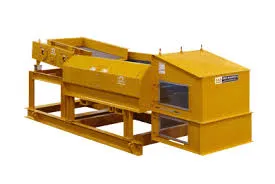
12 月 . 09, 2024 17:59 Back to list
MSW Sorting Plant Revolutionizing Waste Management
As the global population continues to grow and urbanization increases, the challenge of managing Municipal Solid Waste (MSW) has become more pressing than ever. With overflowing landfills and growing environmental concerns, effective waste management solutions are now more critical. One such solution is the MSW sorting plant, which plays a pivotal role in recycling and waste minimization.
An MSW sorting plant is designed to separate and process various types of waste materials collected from households and businesses. The primary goal of this facility is to divert as much waste as possible from landfills, thereby reducing the environmental impact associated with waste disposal. By efficiently sorting waste into reusable and recyclable materials, these plants contribute significantly to a sustainable circular economy.
MSW Sorting Plant Revolutionizing Waste Management
Conveyor belts transport waste to various sorting stations, where advanced optical sorting systems utilize AI technology to automatically identify and categorize recyclables such as plastics, metals, and glass. These systems can accurately differentiate materials based on their composition and color, ensuring higher purity levels in the recovered products. For instance, metals are isolated using powerful magnets, while air jets help separate lighter materials from heavier ones.

One of the critical components of an MSW sorting plant is the recovery of organic waste. Organic materials, such as food scraps and yard waste, can be transformed into compost or biogas through further processing. Composting not only reduces landfill waste but also produces a valuable product that can enhance soil quality. Meanwhile, biogas generation from organic waste provides a renewable energy source that can be harnessed for electricity and heating.
The benefits of MSW sorting plants extend beyond waste diversion. By recycling materials and recovering valuable resources, these facilities contribute significantly to the conservation of natural resources. For instance, recycling one ton of paper can save approximately 17 trees, 7,000 gallons of water, and enough electricity to power an average home for six months. Furthermore, by increasing the recycling rate, MSW sorting plants help reduce greenhouse gas emissions associated with the production of new materials.
Moreover, MSW sorting plants also generate economic benefits. They create jobs in the local community, provide opportunities for innovation in waste management technology, and reduce the overall costs associated with waste disposal. The establishment of sorting facilities can foster local markets for recycled materials and promote sustainability within the community.
In conclusion, MSW sorting plants are essential in addressing the global waste crisis through innovative sorting and recycling processes. By transforming waste into valuable resources and minimizing landfill use, these facilities pave the way for a more sustainable future. As cities around the world continue to grapple with rising waste generation, investment in and support for MSW sorting plants will be crucial in advancing effective waste management strategies and enhancing environmental stewardship. Embracing such technologies can lead to a cleaner, greener planet for generations to come.
Latest news
Unveiling the Power of Eddy Current Separator
NewsSep.25,2024
Transform Your Home Recyclin:home metal shredder
NewsSep.25,2024
The Future of Waste Management with Recycling Line Picker
NewsSep.25,2024
The Benefits of a Metal Recycling Plant
NewsSep.25,2024
Revolutionize Material Separation with Onwang Technology
NewsSep.25,2024
Innovative Waste Management: Unveiling the MSW Sorting Plant
NewsSep.25,2024